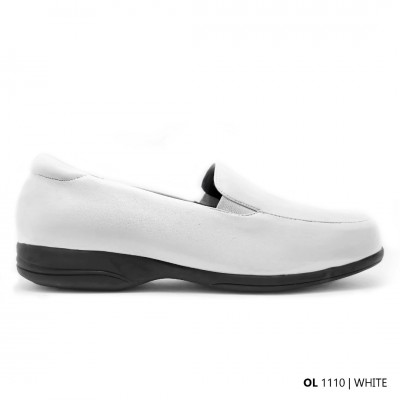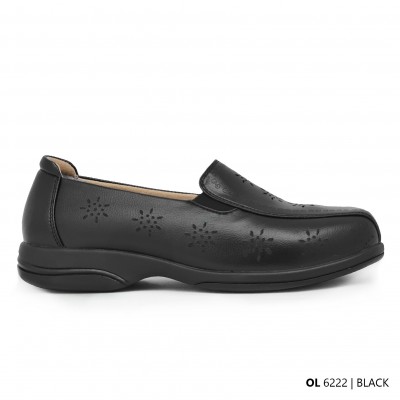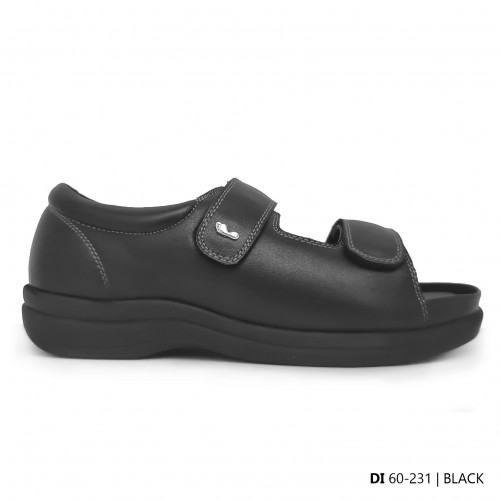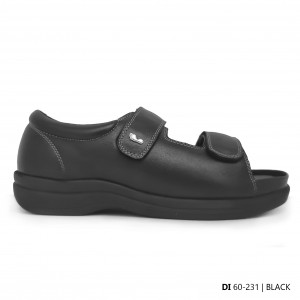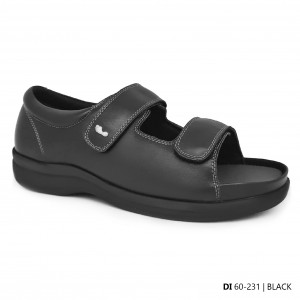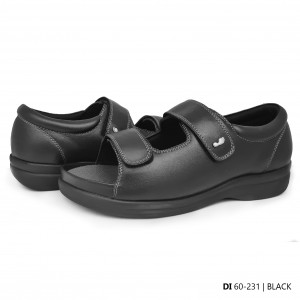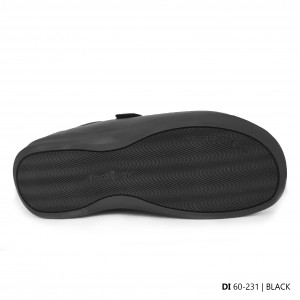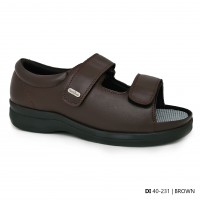D231 Model DI 60-231 - Diabetic Shoe
Diabetic shoes that offer protection and comfort for diabetic feet. Footlink's Diabetic Shoes are bio-mechanically engineered with shock absorption and even weigh distribution to prevent corn and callous formation that causes foot ulcers. Soft upper, firm heel counter.
- Model : DI 60-231
- Colour : Black
- Upper : Synthetic Leather
- Outter sole : Nature Rubber
- System : Dual Density Comfort Footbed (DDCF)
- Measurement Chart for Diabetic Shoes
- UK 12 - 28.1 cm
- UK 11- 27.5 cm
- UK 10 - 26.9 cm
- UK 9 - 26.3 cm
- UK 8 - 25.7 cm
- UK 7 - 25.1 cm
- UK 6 - 24.5 cm
- UK 5 - 23.9 cm
- UK 4 - 23.3 cm
- UK 3 - 22.7 cm
| Description | |
| Colour | Black |
| Upper Material | Synthetic Leather |
Please measure the length of your feet. By following the instruction below.
Please keep in mind that manufactures use different lasts to construct their shoes. Therefore, the shoe sizing may vary accordingly. To approximate your true shoe size, you would need to use any two-dimensional measuring tool such as a ruler or Brannok device®. This is because your foot is three-dimensional.
To measure your shoe size, please ensure that you are standing wearing the socks or stockings you will wear with your new shoes. Using the chart below, convert your centimetre measurement to your UK shoe size
Measurement Chart for Diabetic Shoes
| Measurement (cm) | Size (UK) |
| 29.9 | 15 |
| 29.3 | 14 |
| 28.7 | 13 |
| 28.1 | 12 |
| 27.5 | 11 |
| 26.9 | 10 |
| 26.3 | 9 |
| 25.7 | 8 |
| 25.1 | 7 |
| 24.5 | 6 |
| 23.9 | 5 |
| 23.3 | 4 |
| 22.7 | 3 |
Measuring your feet can be tricky so here are a few very simple steps to help get your feet measured accurately before purchasing our shoes.
STEP 1:- Gather basic supplies

To start with, all you need is :-
§ a piece of paper larger than your foot
§ a pencil
§ tape
§ and a ruler or measuring tape.
Tape the paper down to the floor.
STEP 2:- Drawing the outline (if you are using socks, please draw the outline with your socks on)

Sit with your foot firmly on the floor, and your leg bent slightly forward so that your shin is slightly in front of your ankle. Trace the outline of your foot and remember to measure your foot without shoes, but with socks similar to the ones you’ll be wearing with the shoes you are buying. Hold the pencil or pen upright and perpendicular to the paper. Do not hold it at an angle. Make sure the pencil is resting snugly against your foot as you draw around it. You may actually find it helpful to have someone else trace your foot, but as you can see in this image, it can be done alone.
STEP 3:- Draw straight lines around the outline

Use your pencil to draw straight lines touching the outermost points at the top, bottom, and both sides of the outline.
STEP 4:- Measuring the Length

Use your ruler or measuring tape to measure the length from the bottom line to the top line that you drew in step three. Be sure to hold the measuring tape straight, and find the closest mark that you can (for inches, use the closest 16th mark) – don’t round up or down dramatically. Jot this number down.
Measurement Chart for Diabetic Shoes
| Measurement (cm) | Size (UK) |
| 29.9 | 15 |
| 29.3 | 14 |
| 28.7 | 13 |
| 28.1 | 12 |
| 27.5 | 11 |
| 26.9 | 10 |
| 26.3 | 9 |
| 25.7 | 8 |
| 25.1 | 7 |
| 24.5 | 6 |
| 23.9 | 5 |
| 23.3 | 4 |
| 22.7 | 3 |

